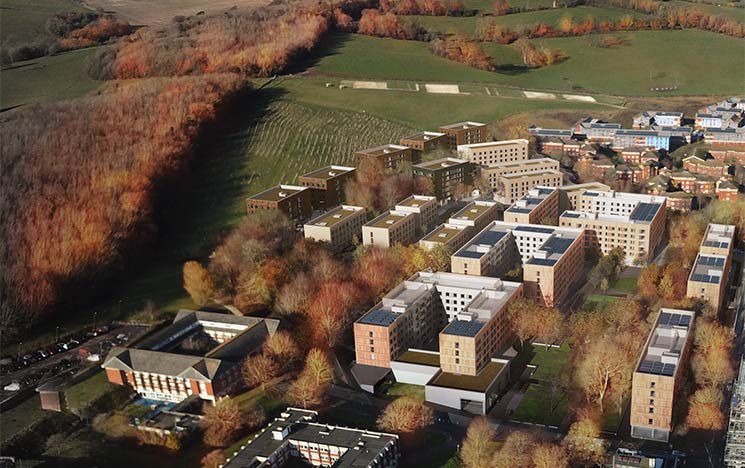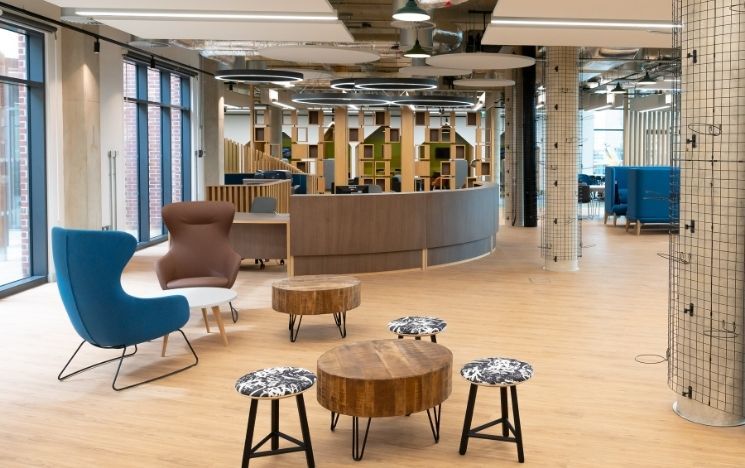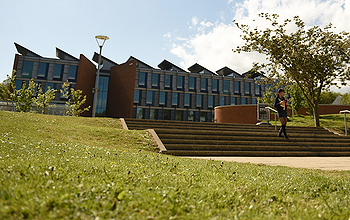Campus development
We’re investing in making the University of Sussex better. Through our campus development, we can maintain our position as one of the world’s leading academic institutions and attract and work with the best and brightest minds.
A better campus
Our experiences of study, work and life over the past few years have highlighted even more keenly the need to provide space that works for all our people – students and staff alike.
We’re investing in making our stunning 60-year-old campus better – with everything from big builds to small changes to our existing space and facilities. These will give us areas that work, providing modern spaces and keeping our historic campus beautiful for another 60 years.
Over the past five years, we have built 2,117 new bedrooms on campus, creating a new student village – East Slope – with a mixture of townhouses and flats as well as study spaces and social hubs. We have also opened the doors of our brand new Student Centre – a multipurpose learning and events space, which as well as being a new hub for student services, offers retail and leisure amenities.
Our next step is the most ambitious programme we have undertaken in recent years. The West Slope development will greatly enhance the student and academic experience, giving the University the infrastructure it needs to continue to be an internationally-recognised centre for excellence, as well as being a covetable place to live, work and forge connections.
Latest news
The future of FM: saving energy and making our buildings smarter
Posted on behalf of: The Better Campus team
Last updated: Wednesday, 23 July 2025
The University Estates division, alongside our new partners OCS, will be working to help make our buildings work more efficiently, saving money on top of helping to reduce our carbon emissions.
Over the course of the seven-year facilities management contract which began on 1 July, OCS have pledged to introduce a number of environmental sustainability innovations as well as a bespoke monitoring and reporting system. The system will use advanced data collection and Smart Building technology to manage and reduce energy use a.
Here’s a closer look at what to expect from our new partnership and how it will help us to better track and curb our carbon emissions.
Managing the way we all use energy
Energy management has now come in-house: it is being run by the Sustainability Team to give us greater control as well as a better understanding of how we use energy on campus.
The FM team, working with experts in OCS and alongside the University's Sustainability Team, will help to provide information that can help us run our estate as efficiently as possible.
We will be able to utilise more data to better inform how we heat and light our buildings as the next phase of work to curb our energy usage gets underway.
Over last winter, work to upgrade the Building Management Systems in 22 campus buildings helped to bring enhanced control over heating, lighting, and electrical systems, improving efficiency and reducing energy use. Wiring and sensors to monitor temperature and light levels were replaced, and software installed to process data from the sensors and identify trends and anomalies, enabling decision-making based on superior information.
Making our buildings work smarter, not harder
In their successful bid, OCS proposed the creation of a Smart Buildings Action Plan, using Advanced Building Intelligence (ABi) and leveraging AI and the internet of things to collect data and boost efficiency. At first, they will conduct a thorough audit of our existing building infrastructure to identify inefficiencies and look at the potential for smart technology integration.
Measuring our carbon impact
The new reporting system will enable us to set targets for any future energy reduction schemes. we will be able to establish a dependable baseline for measuring emissions from OCS, subcontractors and suppliers, and develop this as the contract progresses.
In addition, OCS will set up a dashboard to report on our carbon emissions and costs, waste and recycling rates, water consumption and quality, and social value. This will be followed by an annual report that will highlight opportunities to reduce our environmental impact.
Back to news list
View all campus development news




